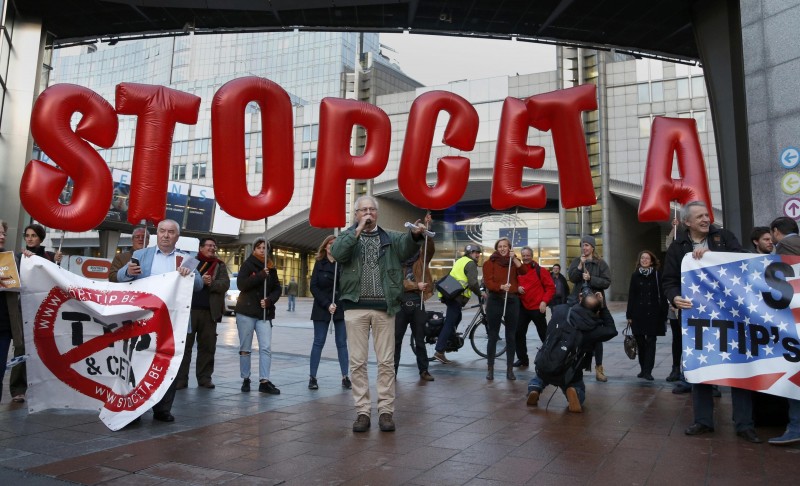With the end of TTIP Game Over Round 2 in Brussels this weekend and daily news emerging over threats of currently negotiated free trade deals between EU, Canada and the U.S. YFoEE Food & Agriculture Working Group are mobilising youth across Europe to take action and claim our democratic rights.

A Quick Recap on TTIP and CETA
Over the last months, two four-letter long acronyms have taken up a lot space in the political realm and activist circles. The Comprehensive Economic and Trade Agreement (CETA) negotiated between Canada and the EU, and the Transatlantic Trade and Investment Partnership (TTIP) negotiated between the EU and the United States, are two trade deals negotiated to a large extent in secrecy, which will have disastrous effects for our environment and our food.
While the negotiations for TTIP have freezed, its twin sibling CETA was signed between the EU and Canada last week. However, for it to come into full effect it needs to be voted in the European Parliament (the date envisaged is the 14th of February) and ratified by the national governments – which means that it can still be stopped!
Some of the most controversial provisions of TTIP and CETA are the ‘trade harmonization’ between the EU and Canada/EU and the US, as well as the ‘arbitration court systems’ (for CETA this is called an Investment Court System).
Trade harmonization
Trade harmonization refers to current ‘barriers of trade’. These barriers to trade, which both TTIP and CETA are trying to remove, are regulations and provisions set by our governments to protect us and our democratic processes. The agreements aim to “harmonize” regulation across the Atlantic to enable trade and does that by lowering the standards of products to the least strict regulations, similar to the ones in the U.S. and Canada. This, for example, might result in chlorine-washed poultry and beef becoming legal in the EU. This threatens the EU precautionary principle, which makes the producer or importer responsible to prove that a product is not carcinogenic, toxic, or generally harmful to health before introducing it to the market. In the US, the precautionary principle does not exist, and in Canada it is differently conceptualised (and does not go as far as the EU one). The signing of TTIP and/or CETA is likely to impede on the current precautionary principle, which can allow otherwise prohibited food practices (such as the use of more chemicals and GMO) to enter the EU market. CETA and TTIP are thus going further than conventional trade agreements, which are more concerned about tariffs and taxes.
Arbitration court system
Arbitration Court System helps to protect corporations’ investments by allowing them to sue governments in arbitrary courts over loss or potential loss of investment. Thus if a government wants to ban a chemical from being used in agriculture because of its serious health implications, international companies that use this chemical can sue the government at an arbitrary court (of which national companies have no access to). This not only gives an advantage to international companies over national ones, but it also gives them power on shaping national regulations, which usually aim to improve our health and wellbeing, as states might become afraid of introducing such legislation in fear of losing money.
Because many US-based companies, including Monsanto, McDonalds, Mondelez and ConAgra Foods have subsidiaries in Canada, they can use the CETA Investment Court System to sue European governments, even if TTIP does not get signed. Belgium has committed to asking the European Court of Justice to check the legality of the Investment Court System, which means that there is a hope that this will be stopped. However this can take a long time – up to two years.
What can be done?
If you are also concerned by CETA and TTIP, don’t feel hopeless – there are things which you can do! Get involved in your local YFoEE groups and run a campaign, or join larger demonstrations or other local groups.

